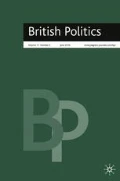Abstract
From a communications perspective much of the commentary and analysis of the 2010 General Election focused on the possible influence of the first ever televised leaders’ debates as well as the burgeoning range of online social networking sites. This article, however, concentrates on the role of that most traditional medium, the national press. The British newspaper industry has been a notable political actor; it has been as controversial as it has been overtly partisan. Arguably there have, however, been some changes to this in recent years arising from Labour's electoral successes and the resulting ‘Tony press’, which was markedly less strident in its coverage and more supportive of the leader rather than his party. 2010 was interesting because there was a revival of the so-called ‘Tory press’ in that these titles adopted a stridency not witnessed since the Conservatives last won an election in 1992. Consequently there is a discussion of why certain newspapers switched allegiances and how this impacted on their reporting. Attention is also given to the differences in campaign reporting by the three sectors of the press, and how the various newspaper readerships voted.





Similar content being viewed by others
Notes
The study covers the period from the first full day of the campaign, that is from the day after it was called, right through to polling day. The broadcasting sampled covered the main news programming, that is BBC 1 (22:00) News, BBC2 Newsnight, ITV News (22:00), Channel 4 News (19:00), Channel 5 News (17:00), Sky News (21:00 bulletin), BBC Radio 4 Today (19:30–20:30) and BBC Radio 1 Newsbeat (17:45–18:00). The entire national newspaper market was also analysed. ‘Quality’ titles refers to the following: the Guardian, Observer, Telegraph, Sunday Telegraph, Times, Sunday Times, Financial Times, Independent, Independent on Sunday; ‘midmarket’ means the Mail, Mail on Sunday, Express, Sunday Express; and ‘populars’ is a synonym for the so-called ‘red tops’, which are the Sun, News of the World, Mirror, Sunday Mirror, People, Star and Star on Sunday.
References
Brownsall, A. (2010) The Independent launches election-themed campaign. Media Week 21 April.
Curtice, J. (1997) Is the sun shining on Tony Blair? The electoral influence of British newspapers. Harvard International Journal of Press/Politics 2 (2): 9–26.
Curtice, J. and Semetko, H. (1994) Does it matter what the papers say?. In: A. Heath, R. Jowell and J. Curtice (eds.) Labour's Last Chance? The 1992 General Election and Beyond. Aldershot, UK: Dartmouth, pp. 43–64.
Deacon, D. and Wring, D. (2002) Partisan dealignment and the British Press. In: J. Bartle, R. Mortimore and S. Atkinson (eds.) Political Communications: The British General Election Campaign of 2001. London: Frank Cass, pp. 135–149.
Firmstone, J. (2008) The editorial production process and editorial values as influences on the opinions of the British press towards Europe. Journalism Practice 2 (2): 212–229.
Harrop, M. and Scammell, M. (1992) A tabloid war. In: D. Butler and D. Kavanagh (eds.) The British General Election of 1992. Hampshire, UK: Macmillan, pp. 180–210.
Linton, M. (1995) Was it the Sun Wot Won It? Guardian Lecture, Nuffield College Oxford, October.
Newton, K. and Brynin, M. (2001) The national press and party voting in the UK. Political Studies 49: 265–285.
Wring, D. and Ward, S. (2010) The media and the 2010 campaign: The television election. Parliamentary Affairs 63: 4.
Yelland, D. (2010) Nick Clegg's rise could lock Murdoch and the media elite out of UK politics. Guardian 19 April.
Acknowledgements
Many thanks to Helen Cleary of Ipsos MORI for supplying figures on readership voting patterns and to Freddie Attenborough, Pete Beamen, Mick Billig, John Downey, Liz Fowkes, Emily Harmer, Peter Riley-Jordan, James Stanyer, Ian Taylor, Georgina Turner and Morris Ward in the Loughborough University Communication Research Centre. We would also like to thank Jonathan Potter for his valued support for our work. Finally, we pay a special tribute to our colleague, mentor and friend Peter Golding for all his inspiration and support over the years.
Author information
Authors and Affiliations
Corresponding author
Rights and permissions
About this article
Cite this article
Wring, D., Deacon, D. Patterns of press partisanship in the 2010 General Election. Br Polit 5, 436–454 (2010). https://doi.org/10.1057/bp.2010.18
Published:
Issue Date:
DOI: https://doi.org/10.1057/bp.2010.18



